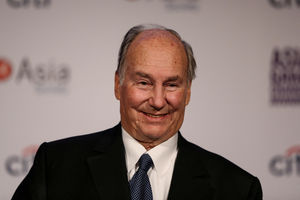Aga Khan hospital project takes off

President Yoweri Museveni with His Highness the Aga Khan (2nd L), Prime Minister Dr Ruhakana Rugunda (L) call for Opecprime Property (U) Ltd lawyer Elly Karuhanga to join them and Prince Hassan Kimbugwe (standing right) in a group photograph after the ground breaking at Nakawa Wednesday December 17. PHOTO | STEPHEN WANDERA
What you need to know:
The multi-billion hospital is built in Uganda. The first phase of the project, planned to cost $100m, will be completed in 2020. The hospital will have a 600-bed capacity
Kampala. His Highness, The Aga Khan yesterday officiated the initiation of the construction of an ultra-modern Aga Khan University Hospital in Kampala which he revealed will be dedicated to offering specialised treatment to Ugandans and patients from neighbouring countries.
The hospital, he added, will be part of an integrated healthcare system in the region and will underline the e-health system to enhance relationship with the other two Aga Khan hospitals in Nairobi and Karachi, Pakistan — both of which certified and accreditation by the US Joint Commission International — as gold standard/ first class hospitals.
President Museveni also attended the groundbreaking for the multi-million dollar project at Nakawa before hitting the campaign trail in Eastern Uganda. The first phase construction to cost $100m (approx. Shs 3 trillion) will be completed in 2020 with a 150-bed tertiary wing but the plan is to have an overall 600 bed capacity.
The Aga Khan said the hospital will also cover other enormous areas, not just health, but including education, training and research to be able to offer the best medical treatment possible. “It is this research which will enable the Aga Khan University hospital to bring new knowledge in areas that we desperately need,” he said.
“It is important to keep in mind that disease is changing in its nature. This hospital therefore will deal with non-communicable diseases like diabetes, cancer, cardiovascular diseases and hypertension.
These are areas that we must concentrate on to be able to serve the needs of the future,” he added.
Non-communicable diseases (NCDs) according to the World Health Organisation, are diseases that are non-infectious or non-transmissible but chronic diseases, progress slowly and last for long periods of time. NCDs include hypertension, cardiovascular [heart] diseases, diabetes, chronic respiratory diseases, mental illness, cancer conditions, injuries as well as oral diseases.
Information from the Ministry of Health website indicates NCDs particularly; heart diseases, diabetes, cancers, as well as chronic obstructive pulmonary diseases are becoming increasingly important as causes of morbidity (illness) and mortality (death) in the population.
Uganda Cancer Institute 2013 data, shows that for the last three years, the number of cancer patients shot up from 1,200 to 2,800 with more than 60 per cent of the patients showing advanced cases of the ailments. According to the institute report, 70 per cent of people who turn up at the institute are normally diagnosed with cancers which are in the fourth stage, which is the very late stage.
The Uganda Heart Institute records have demonstrated a 500 per cent increase in outpatient attendance due to heart-related conditions from 2002-2009. The 14 regional referral hospitals also have reported an increasing number of diabetes and chronic obstructive pulmonary disease patients either admitted in their medical wards or seen at their out-patients clinics.
“Modern medicine is very expensive and it is our responsibility to make it available to everyone,” the Aga Khan added. He revealed the hospital will equipped with state-of-the-art medical equipment like the Magnetic resonance imaging (MRI) and CT scans, and will offer nuclear medicine as well used in cancer diagnosis and specialised treatment.
The hospital however will also provide advanced types of care and specialties in women and child health, cardiology and cardiothoracic, surgery and regenerative medicine, neurology.
Speaking at the groundbreaking at Nakawa, President Museveni scolded officials in government for dragging feet on offering land to the project which has cost two years.
“I am sorry the project has delayed but it’s good now we are taking off,” he told the Aga Khan. He applauded the Aga Khan, the Ismaili community and the Asian-Ugandans [at large] for their contribution, which he said they have filled the entrepreneurship gap that was missing. “Our Asian people really do a lot of work. [and] They have done a lot to the recovery of this economy.”
Mr Museveni also assured the project every possible to ensure it is realised in time.
The groundbreaking as also attended by Attorney General Fredrick Ruhindi, State minister for Education in charge of Science Dr Tickodri Togboa, Health minister Dr Elioda Tumwesigye and Prince Hassan Kimbugwe, from OpecPrime Properties, among others.
The hospital complex and attendant infrastructures will sit on 60 acres of land in Nakawa which was reclaimed from 160 acre Nakawa-Naguru land which was in 2005 given to OpecPrime Properties, a local company that was representing the Comer Group of the UK, for redevelopment into a mega satellite city but has since dragged on. Mr Museveni thanked Prince Kimbugwe, for cooperating with the Aga Khan to pave the way for the project.
Health minister Dr Tumwesigye said with the hospital offering specialised treatment it will save the country the big budget it spends on sending officials and the well-connected abroad for treatment. Government, he said, currently spends about shs237b ($70m) on treat abroad.




